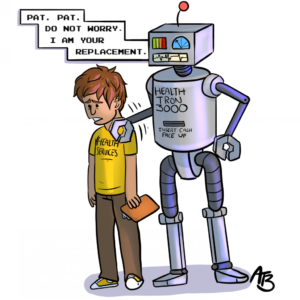The staff editorial is the majority opinion of The Murray State News Editorial Board

Our health care system’s identity crisis has been in the media spotlight for the past several years. Rising insurance and drug costs, along with uncertainties surrounding the future of the Affordable Care Act, have put many on edge about our nation’s health. Thankfully, students and staff here at Murray State University have been able to look within our own campus for medical care through Health Services.
But as Murray State supposedly looks to cut costs across the university budget, our wellness and wallets may bear the most burden if Health Services are privatized as recent rumors and proposals suggest might happen.
So, what does ‘privatization’ really mean? According to the Merriam-Webster Dictionary, it is “to change from public to private control or ownership.” This process typically results in reduced operating costs and less privacy and insurance concerns for those relinquishing responsibility for said services.
Privatization of university facilities is nothing new – for example, Western Kentucky University’s Health Services are now operated by Graves-Gilbert Clinic, a medical juggernaut in Bowling Green, KY. Campus food operations are another high-rate target of privatization efforts.
Currently all fees for access to Health Services are built into student tuition. Of course, if one doesn’t utilize the facility this charge does not go away.
If an outside entity were brought to campus, insurance billing and copays would almost certainly follow. And for the percentage of students who don’t have insurance, either by choice or due to financial concerns, this could mean the difference between having access to health care or none at all.
However, the university may have just as much to lose by outsourcing campus wellness.
Murray currently has several options when it comes to medical care including Fast Pace Urgent Care, Primary Care Medical Center and others. They have competitive payment options for both cash-paying patients and those with insurance. Plus, the services they provide far outstrip what is currently offered by Health Services.
So what’s to keep the student body from going off campus for their medical care if there is no incentive to visit a privatized facility on campus?
Location is a factor for those without private transportation, but it’s hard to believe most don’t have a friend or guardian who would help if the need arises. Affordable cab services are cropping up every week as well.
Any facility on campus would have to provide highly competitive pricing and services comparable to other providers in town to compete. However, it’s unlikely a private business would allow their services to become too devalued as making a profit would be their main goal.
For those who have visited Health Services, it is obvious there is limited space. So to provide these expanded services, more space would logically be needed. This means more construction on campus and a hefty price to go along with it – but who would be responsible for these costs, the business or the university (i.e. tuition-paying students)?
Since privatization would lessen the financial burden on the university, what then will happen to the charges built into our tuition? Will those be deducted from the consistently rising cost of attending Murray State? Our guess is no, but it is all pure speculation at this point in the process.
Gov. Matt Bevin recently made comments regarding public state universities and their obligation to be fiscally responsible. Changes to campus operations in the form of privatization, among others, would without a doubt achieve this goal of saving money.
But if changes are to be made, what are students willing to give up? And what is the university prepared to sacrifice in order to stay operable?
Murray State University claims to always have the well-being of students and staff in mind. We must hold them responsible for their commitments.
Here’s to hoping our health doesn’t bottom out to pad the university’s bottom line.































































































